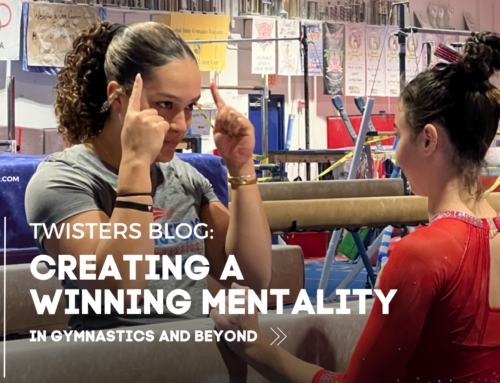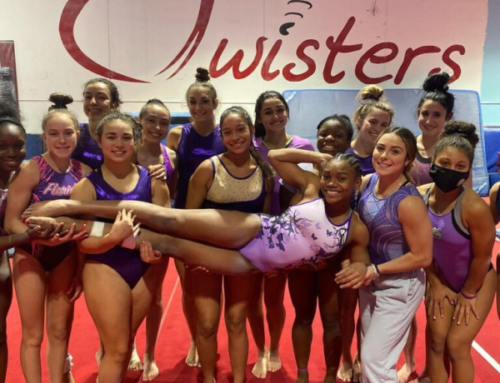
The start of a new school year is a particularly difficult time for many gymnasts, especially as they get older. They are required to do the intense gymnastics training they did all summer long while balancing the additional demands and challenges of new teachers and a full schedule of academic classes. Their teachers emphasize how seriously they need to take their performance in each of their classes and how they will be expected to produce high quality work that will be incrementally more difficult than it was in their prior grade. Most gymnasts are perfectionistic and hardworking, so they are oftentimes initially overwhelmed by the pressure of trying to balance the more stringent demands of their new academic grade with those of their higher level gymnastics skills.
Time management is a skill that is essential for children to have success in school, gymnastics, and life. They can learn the basics of time management and the importance of prioritizing tasks and responsibilities. Without these skills, they may feel immobilized and overwhelmed. Oftentimes, the first reaction children have to this sense of being overwhelmed is the fight or flight response. Most gymnasts are not going to rebel against the demands of their teachers, homework, coaches, workouts, or house rules, so they opt for the “flight” mode. Since dropping out of school or running away from home are not viable options, gymnasts may suddenly have an urgent desire to quit gymnastics due to the strong urge to escape the pressure they are experiencing. Parents and coaches might wonder where this abrupt crisis came from, since everything seemed great with gymnastics over the summer. What likely happened was that the gymnast realized if she could eliminate some of the demands upon her she would immediately feel better. Eradicating the demands gymnastics places upon her is a quick fix to the crisis she is currently experiencing. While retiring from gymnastics is a sound decision for a gymnast under the proper circumstances, it is important to ensure that the gymnast is not seeking reprieve from her sport because she is overtaxed with managing the demands of a new school year.
With this information in mind, it is a good idea for the gymnast and her family to refrain from making major life decisions at the start of a school year. A helpful approach to take is to encourage the gymnast to stay in the present moment. Have her go through her day completing her responsibilities to the best of her ability, regardless of any feelings of anxiety or frustration that she might be experiencing. Encourage her to communicate her feelings and needs to her parents, teachers and coaches. Help her understand that feelings of anxiety and pressure can’t hurt her unless she gives it the power to do so. Let her know that if she sits with these uncomfortable experiences while she does what she needs to do each day, they will gradual lessen in intensity. Assertively communicating her needs will also identify when there is an issue that needs attention.
Since gymnastics is such a big part of a gymnast’s life, it is worthwhile to invest the effort needed to find a way to make it fit comfortably into her life as she changes and grows. The increasing demands of middle and high school will challenge a gymnast to ease up on her perfectionistic expectations she has set for herself. This will allow her the space necessary for growth and learning. A gymnast should be encouraged to accept herself where she is at this very moment. She should strive to allow herself to learn new skills at her own rate and refrain from comparing her rate of learning or performance against a teammate’s. It is most
helpful for her to emphasize and notice the effort she gives each day at practice and then allow herself to feel proud that she showed up and gave what she had that day. When a gymnast stays in the present moment, she will not be frozen with worries or fears of where her skills will be when season starts. Gymnasts should be encouraged to express to their coaches when a skill is too tough, scary, or when they don’t understand their coach’s corrections, so that the training rate can be slowed to match the gymnast’s learning rate.
Using this stress management approach to training should significantly reduce the pressure a gymnast experiences, especially at the beginning of the school year when there is so much “newness” and pressure from all directions. Giving herself permission to just enjoy working out and mastering skills at her own pace will increase her confidence and comfort to adjust her training schedule to meet her academic needs when necessary. There will be times when it is necessary for her to leave practice early to complete a large homework assignment or to miss practice when she has to study for multiple tests that are being given on the same day. Gymnasts are often reluctant to miss practice because they are afraid they will get in trouble or fall behind their peers. A gymnast who is preoccupied with thoughts about school while in the gym is not productive, easy to coach, and is at higher risk for injury, so it is best for everyone involved if the gymnast takes time to address her academic needs when appropriate.
Reducing self-imposed, rigid rules like, “I have to get this skill” or, “I need to be level X,” will enable a gymnast to train at a comfortable and natural rate. This type of mental flexibility will enable the gymnast to enjoy her gymnastics long-term while experiencing more success, confidence, and enjoyment in all areas of her life. It is vital that a gymnast approach her training in a kind and accepting manner, so that she may experience success and enjoyment without the burden of pressure and stress.
Here are some practical tips to help with time management and balancing the demands of competitive gymnastics with academics:
1. Talk with the gymnast’s teacher about getting homework/study assignments on Fridays so that the weekend can be used to complete a lot of the time-consuming, independent learning tasks that are given on a weekly basis, such as spelling and reading activities.
2. Get a note from the pediatrician allowing the gymnast to have water with her at all times and a snack every 2 to 3 hours throughout the school day. This can help prevent drops in blood sugar that lead to headaches, moodiness, and difficulty with concentration and attention.
3. Request an early dismissal. Elementary schools will often do this when they are able to accommodate it within their schedule. Middle and high schools will usually permit students to leave 1 or 2 periods early. This can be arranged with the principal and guidance counselor during the summer. Usually an online class is taken through Florida Virtual School (FLVS) to ensure that graduation requirements are met. Sometimes a letter from the head coach documenting the hours spent training each
week allows some middle school principals to waive an elective credit, due to the training exceeding the equivalency of the requirements of a physical education course.
4. Pack clothes and snacks so the gymnast can change and eat before she gets to the gym. The line for the bathrooms at the gym is long and it can be stressful to be stuck in line knowing that you will be late for warm-ups. To avoid this, the gymnast could change in the restroom prior to leaving school or could stop at a fast-food joint and use their restroom to change. The gymnast could eat a light snack on the way to the gym and take additional snacks to refuel throughout the workout between rotations.
5. Incorporate short, convenient times to study—driving to/from school and the gym, 10 minutes in the morning before school, 10 minutes after practice (book lights are great). Alternating tasks, like showering and eating, and privileges like screen time, with homework helps to make the task less overwhelming and motivates gymnasts to focus and work quickly, so that they can do what they really want to be doing at that time, which will most likely involve Snapchat, Instagram, or Netflix.
6. Take care of family needs. Take a day off from the gym for movie night or leave practice early to have a “family dinner.” These activities are important for gymnasts to appreciate that there is more to life than their performances at school and in the gym. These are also great opportunities to communicate unconditional love and support.
7. Maintain strong sleep habits. Make sleep a priority and get at least 8 hours nightly. When a gymnast is tired and cranky it might be best to go to sleep earlier and wake up earlier to complete homework. Proper sleep is a must for optimal performance in the gym and classroom.
8. Emphasize that gymnastics is an “extra” and is done for enjoyment and health. It is a great way to keep in shape, learn how to master a challenge, and develop important life skills, like goal-setting, overcoming fear, time management, and self-acceptance.
When practiced in a healthy manner, gymnastics is a magnificent platform to enhance the personal growth and well-being of a developing child.

Dr. Christine Hiler Psy.D. is the head of the Sports Psychology program for American Twisters and a valued member of the Twisters organization. She conducts sports psychology small group sessions with the Twisters optional level girls, Levels 6 through Elite every other week. She works closely with the girls on goal setting, psychological performance enhancements, and group/team dynamics.



